11 Best Blogging Platforms in 2023 (& How to Choose One)
Are you ready to start your own blog but are having trouble deciding on the best blogging platform for your needs? We are here to help. Right now there are more choices than ever for starting a blog. In this article, we’ll help you choose the right blogging platform by giving you some things to consider beforehand. Plus we’ll give an overview of the most popular blogging sites out there – their pros and cons, features, pricing, and more.
How to Choose the Best Blogging Platform? (What to Look for)
Here are a few things to consider before choosing a blogging platform:
What kind of blog do you want?
Not all blogging platforms are the same. WordPress is a popular content management system (CMS) that can run an entire website as well as a blog but require a steeper learning curve for optimization. Other publishing platforms like Squarespace can handle all that technical stuff for you (domain, hosting, security, SEO, etc.) so you can concentrate more on creating content. And some blogging sites, like Tumblr, are more for social networking. So depending on your goals, the type of platform you choose will need to be able to handle them.
It is important to think long-term. You don’t want to join a platform that isn’t scalable to your future needs. You might find you will want to add more features to grow your blog and monetize it later. So it’s important you make sure the platform you choose offers these options.
Should You Host Your Blog or Have the Platform Host It?
Perhaps the biggest decision to make for your blog is hosting. Do you want to handle hosting your blog or do you want the platform to take care of that for you? If you want to go the self-hosted route, WordPress is hard to beat. But if you want a hosted platform, your options are more difficult. The most important difference between self-hosted platforms like WordPress and hosted platforms is that hosted platforms can be more limiting when it comes to adding customizations and functionality beyond the scope of the platform you choose. A hosted platform will definitely simplify the blogging experience initially, but choosing the wrong one may limit you in the future.
How Much Can You Afford?
Hosted blogging platforms are typically cheaper than hosting a blog yourself depending on which hosting provider you choose. Some hosted publishing platforms cost as little as $5 per month for a fully functional website with a personalized domain. And some self-hosted platforms can offer a free option. That being said, once you add hosting costs, premium plugins, and themes, the cost for a hosted website (even on WordPress) can get pretty pricey.
Be careful of signing up for a cheaper all-in-one platform that will require paid upgrades later on. And, if you want to host your own site, consider hosting platforms that have plans that scale to your needs as your blog grows.
Are You a Creative Type?
Another thing you should determine is how much control you need over your site’s design and layout. With self-hosted sites, you have ultimate control over which theme you use, the way it looks, and how it functions. With the hosted website builders, you’ll have limitations depending on the platform you choose. Some hosted website providers offer hundreds of templates to choose from, while others provide a few.
The 11 Best Blogging Platforms (Compared)
While there are other considerations (overall traffic and user scaling, number of contributors, and so on), these should help you narrow down your choices considerably and let you choose the best blogging platform for you. With that in mind, let’s take a look at your options.
1. WordPress.org

WordPress.org is one of the most robust and flexible blogging platforms out there. WordPress can handle any needs a blogger would need. With built-in full site editing, a drag-and-drop block editor, countless themes and plugins, and page builders like Divi, you can rest assured your blogging site will be easy to design and never lack the functionality you may need in the future. The WordPress CMS software is perhaps the best CMS for websites. It is free to use but to get your blog up and running, you’ll need to pay for a hosting provider yourself. However, with a good WordPress hosting platform, the sky is the limit for your blog.
Pros
- Massive repository of free themes and plugins for all your blogging needs.
- A dedicated community of developers and users with countless tutorials to help the learning curve.
- Easy to install and set up for beginners.
- Can run any kind of website, from a blog to an eCommerce store to a membership site to anything else you can think of
- A publishing-centric content editor that rivals other all-in-one platforms like Wix and Squarespace.
- Managed WordPress hosting providers (such as Cloudways, Siteground, and Flywheel) are available if you don’t want to worry about the technical side of hosting your own website.
- Available plugins give you more control over security, performance, and SEO than with other hosted platforms.
Cons
- Basic installation isn’t enough in most cases. You need to customize it to be production-ready
- Extra work is needed to maximize the security of WordPress websites. Other hosted platforms may be more secure out of the box.
- There is still a learning curve for beginners.
- No customer support included
- You’re responsible for getting your own domain name and hosting platform but other performance and SEO optimizations.
WordPress.org is for you if…
…you want to own and control your content without limitations. You can run any kind of website you want, from a simple blog to a complex eCommerce shop. And you can go crazy and customize everything exactly as you want it, rely on pre-made designs and templates, or some mix of them both depending on your budget, time, and skills. For those who aren’t up for the technical side, Squarespace or WordPress.com is a better choice.
Pricing: FREE
2. WordPress.com

Although built by the same people, WordPress.com is quite a bit different from its .org counterpart. WordPress.com was initially created for people who want the features of WordPress.org without the hassle of all the technical issues (like hosting).
For beginners, there are a few benefits to WordPress.com. You can choose your own theme, add some plugins, customize the appearance, and add users. However, those features are quite a bit more limited than WordPress.org. There is no setup, it’s free for a basic account, and you can get started with your first blog post in a few minutes after signing up.
The free plans are limited in what you can do and add, but for a monthly fee starting at around $5 USD, you can add your own URL, install (some) premium themes and plugins, and remove the WP.com advertising.
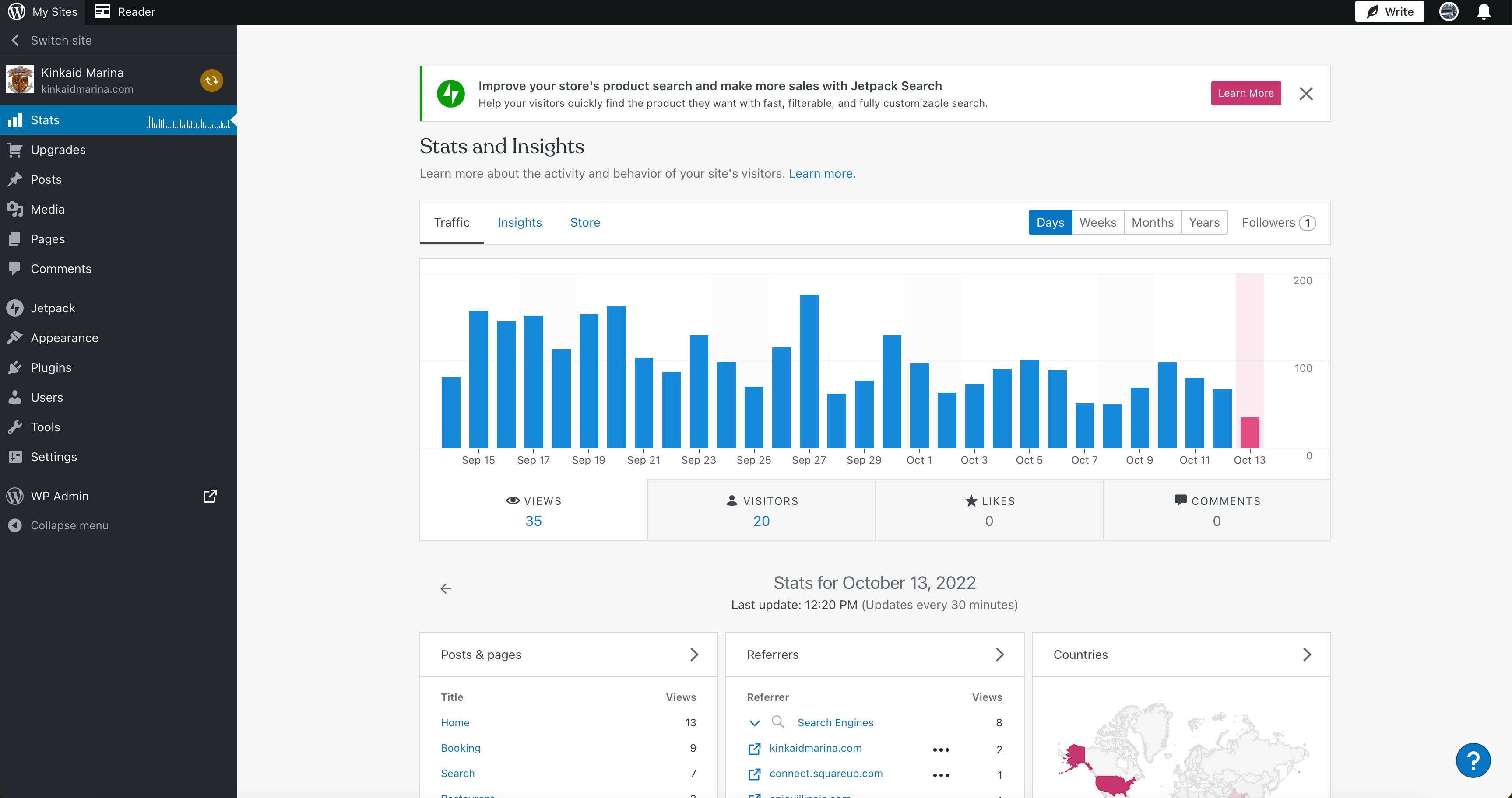
JetPack is built-in, and offers site stats, backups, security features, and expanded search functionality which is perfect for bloggers.
Pros
- Easy to set up and use
- Basic plan is free
- Behind-the-scenes tech issues are handled for you
- Similar publishing tools as WordPress.org
- Built-in features from Jetpack (security, site stats, limited CDN, and more)
- Built-in features for marketing and integration
- Huge community and reliable support.
Cons
- The free tier is ad-supported, so you have to pay to make them go away.
- Access to premium plugins and themes is restricted
- Monetization restrictions on the free plan.
WordPress.com is for you if…
…you are a beginner that wants a more streamlined hassle-free blogging experience. WordPress.com handles all the technical stuff for you so you can concentrate on blogging. As long as you can deal with some limitations on design and functionality, WordPress.com is a great middle-ground between the freedom of WP.org and the accessibility of something like Wix or Squarespace.
Pricing: FREE, Paid plans start a $5 per month
3. Squarespace

Squarespace is an all-in-one website builder and blogging platform geared toward eCommerce users. Best known for its eye-catching templates, Squarespace makes it easy to establish an online presence with ease, making it a big competitor to WordPress. They offer good value for those without much technical experience that want to be able to integrate social media, sell products, and customize their site effortlessly.
Squarespace offers a fully functional blog post editing tool with over 45 modules to choose from including image galleries, newsletter opt-ins, custom code, accordion, charts, scheduling, and social media integrations. Users can connect social media accounts and the drag-and-drop editor gives bloggers a great way to personalize their posts and products to stand out from the competition.
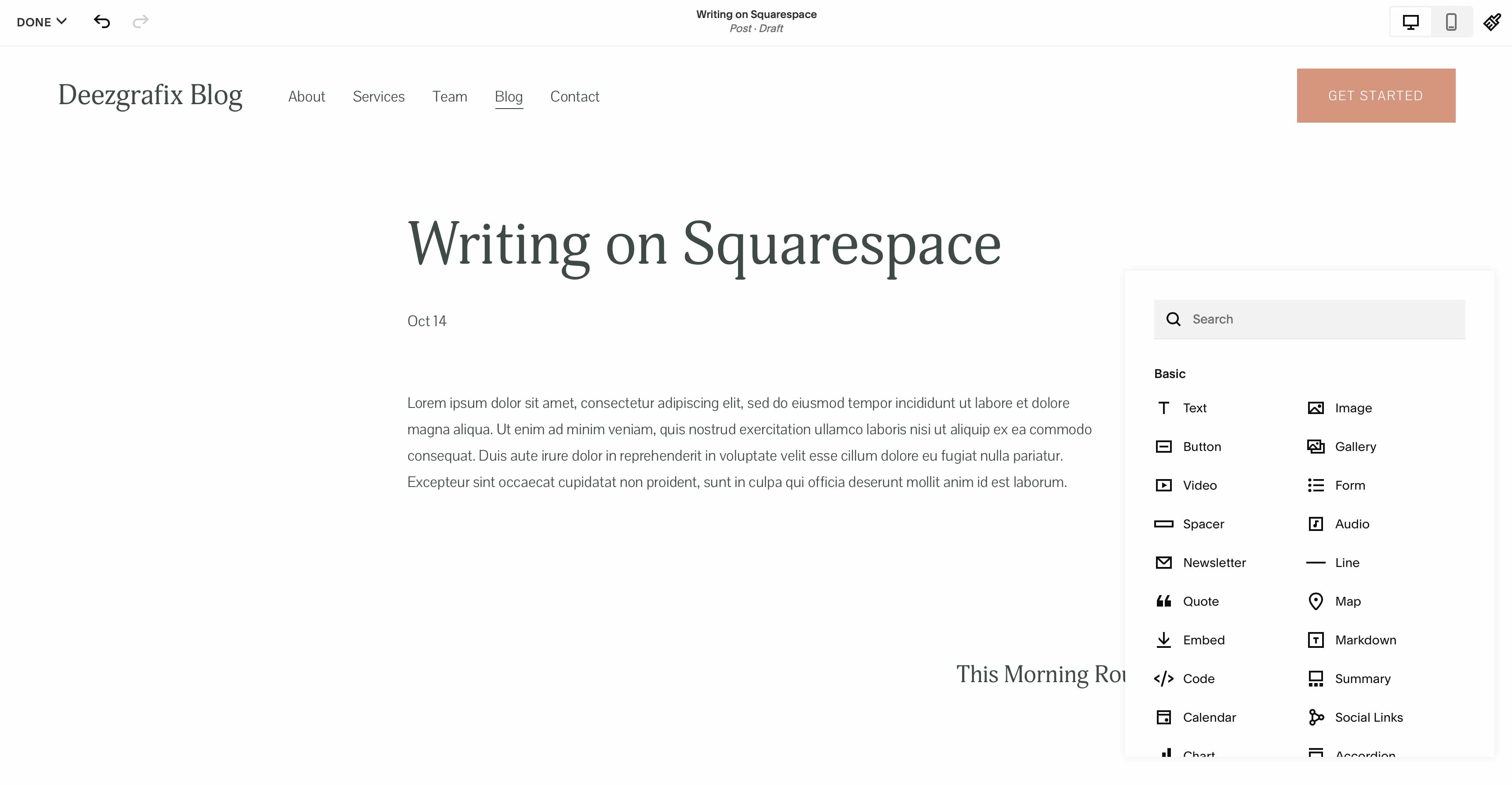
Users can choose from 100 premade sections, a portfolio page option, and pre-built color palettes to get those creative juices flowing.
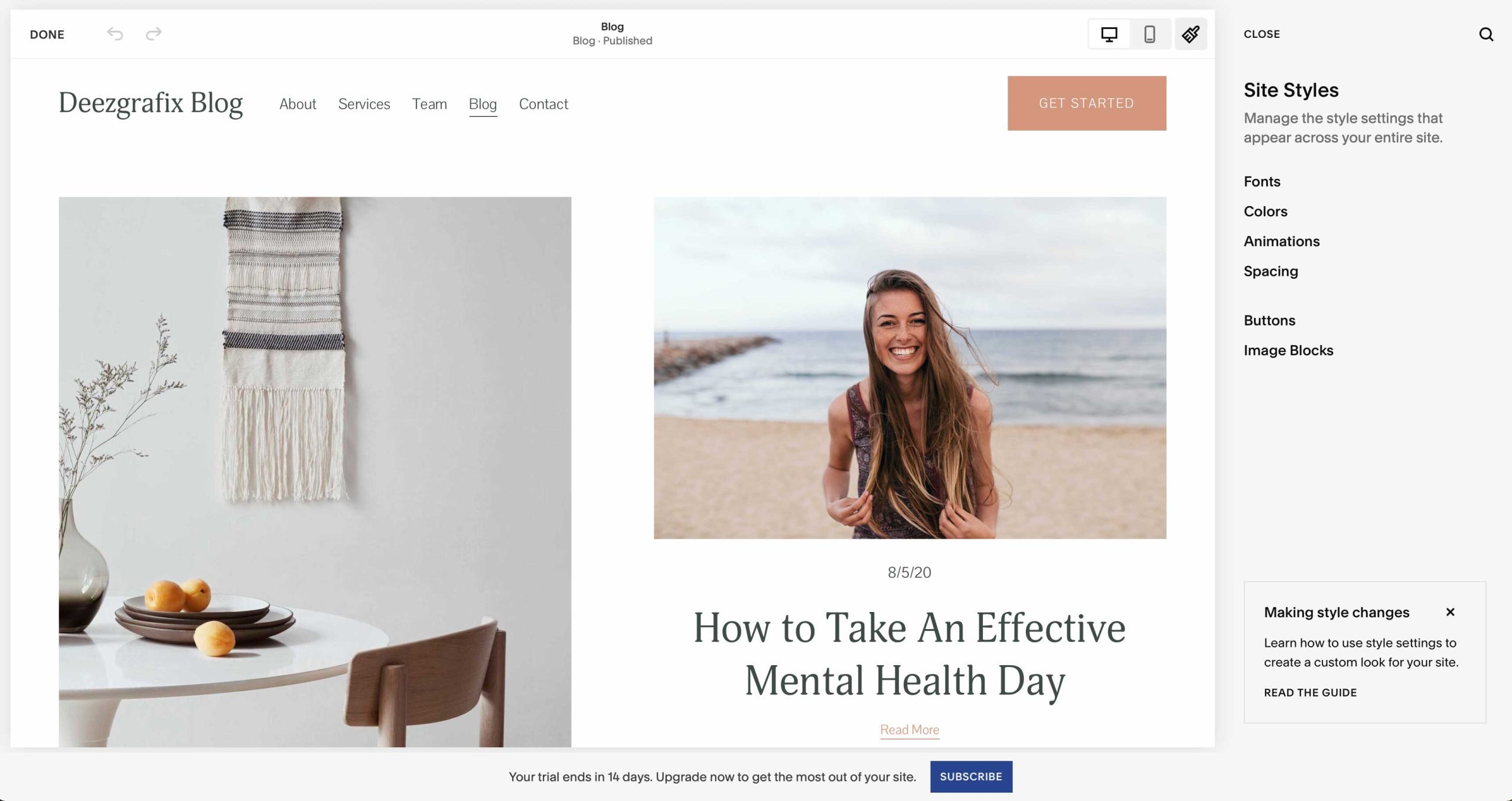
Squarespace offers some good marketing tools including email campaigns, promotional pop-ups for customer acquisition, an announcement bar, and social media promotions on Instagram, Facebook, and Pinterest.
Pros
- Stunning website designs out of the box
- No design or development experience required
- Can run full websites or just blogs
- You get full control of audience info and retention
- Dozens of free templates to choose from
- Hosted by Squarespace, so you don’t need to have a separate host
Cons
- Monthly fee
- Tied to their platform
- Might be restrictive to people who are used to having full control over design and development
- No add-ons outside of the official Squarespace themes
Squarespace is for you if…
…you prefer the hands-off approach. If you want to keep your focus on blogging or selling and not on the website itself, Squarespace will be a good fit. In a lot of ways, Squarespace is the iPhone of the blogging platform industry. It is slick, pretty, easy to use, does pretty much everything, and has just enough customization to keep most folks happy. Some folks may feel restricted, and if that’s you, WordPress or Ghost are better options. For those who like to be taken care of, Squarespace is the way to go.
Pricing: FREE, Paid plans start at $23 per month
See our review on Squarespace vs WordPress
4. Weebly

Weebly is a hosted website builder that can function as a full website or blog. In fact, Weebly now focuses on a built-in integration with Square (not to be confused with Squarespace) to take payments and work as an eCommerce platform to rival Shopify. If that’s part of your focus as well as blogging and content creation, Weebly might just be a good option. Plus, they have incredibly slick and well-made templates and themes, not to mention a robust plugin library. Weebly is aiming for a more professional user base than platforms like Blogger.
Weebly’s no-code drag-and-drop editor is considered by some to be even more user-friendly than WordPress, Creating and publishing a post is easy. Simply drag one of many elements into the page, then start typing. The writing process is quite similar to the WordPress editor, so those familiar with how WordPress functions will find it quite simple to master.
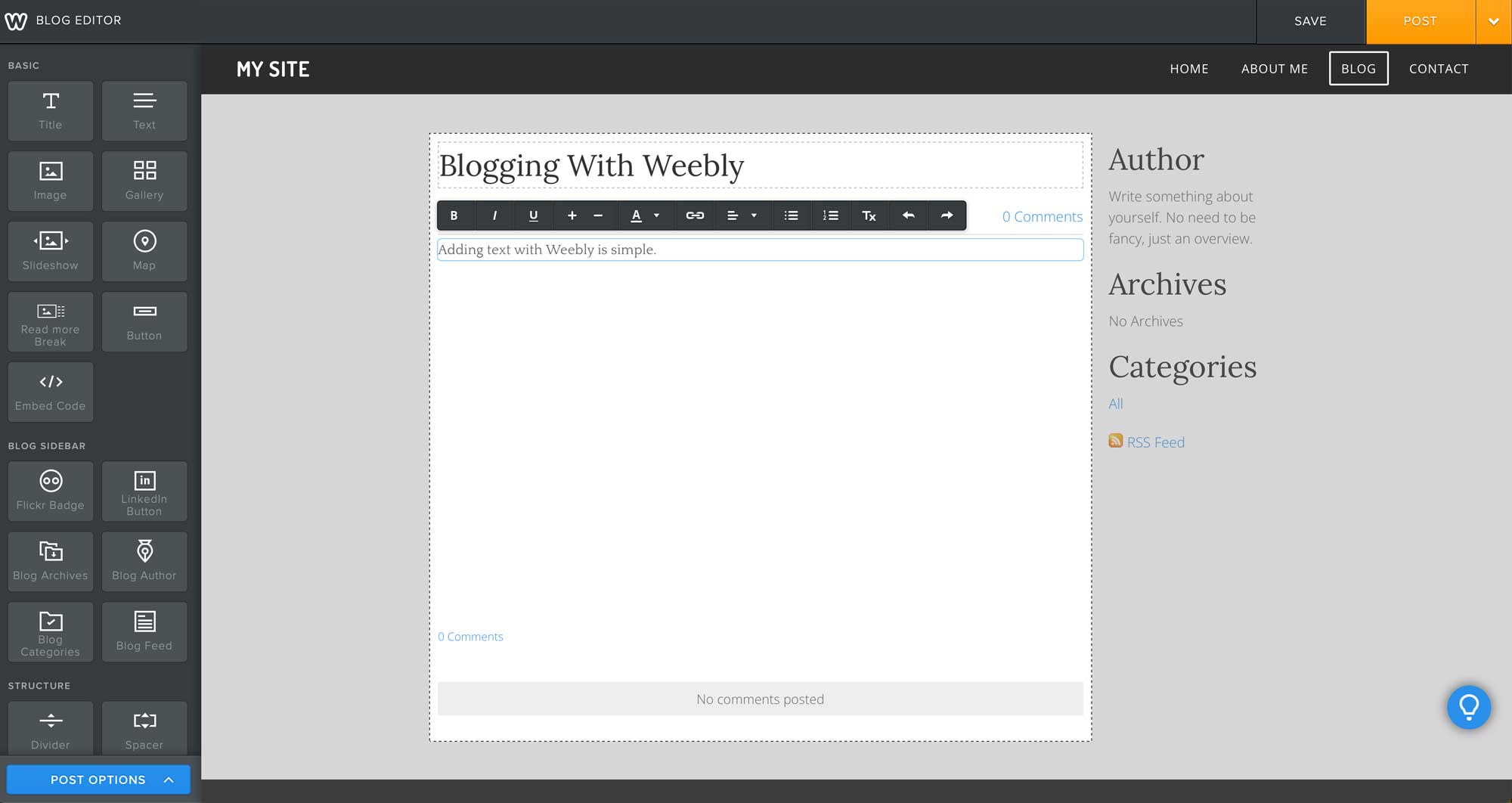
Pros
- User-friendly interface
- Professional themes and lots of plugins
- Solid eCommerce platform with a secure payment portal
- Easy to set up and use
- Not a lot of technical experience required to get started
Cons
- The free plan is fairly limited
- Outside of the plugin library, not a lot of customization options
- Potential trouble if you leave the platform
- SEO limitations
Weebly is for you if…
…you want a blog that looks like it was professionally designed out of the box. Weebly is easy to use, and you don’t need a lot of design experience to get it looking good. It is also a great option for adding an eCommerce store. With the Square payments integrated, you don’t have to worry about nearly as much setup as you would with WooCommerce on WordPress, for instance.
Pricing: FREE with paid plans starting at $13 per month
See our review on Weebly vs WordPress
5. Wix.com

Wix.com is a popular website builder that also offers blogging capabilities. It is best for those wanting to get any kind of website or blog up and running quickly. When signing up for Wix, the setup process is quick, and the Wix dashboard is intuitive for getting started with adding blog posts right away. Wix has a similar post structure as WordPress where posts are assigned to categories for easy structuring.
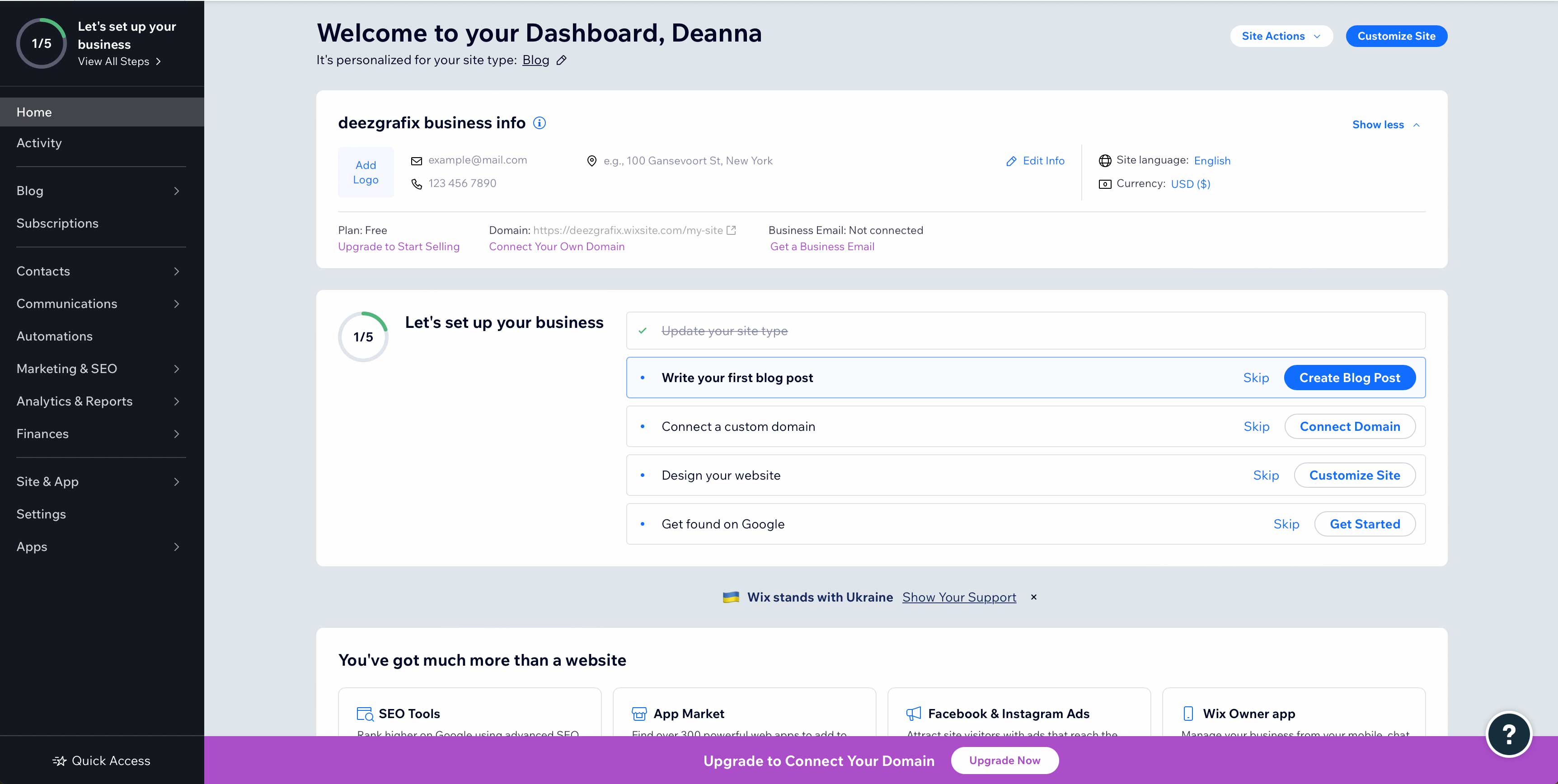
Wix gives you the ability to import WordPress blog posts from another site if you’re contemplating switching platforms. Additionally, you can choose a pre-made blog post template for your posts if you don’t have the time or desire to create a layout yourself. The site builder is an easy-to-use site builder with a drag-and-drop interface. You can have your blog up and running within an hour when choosing a template.
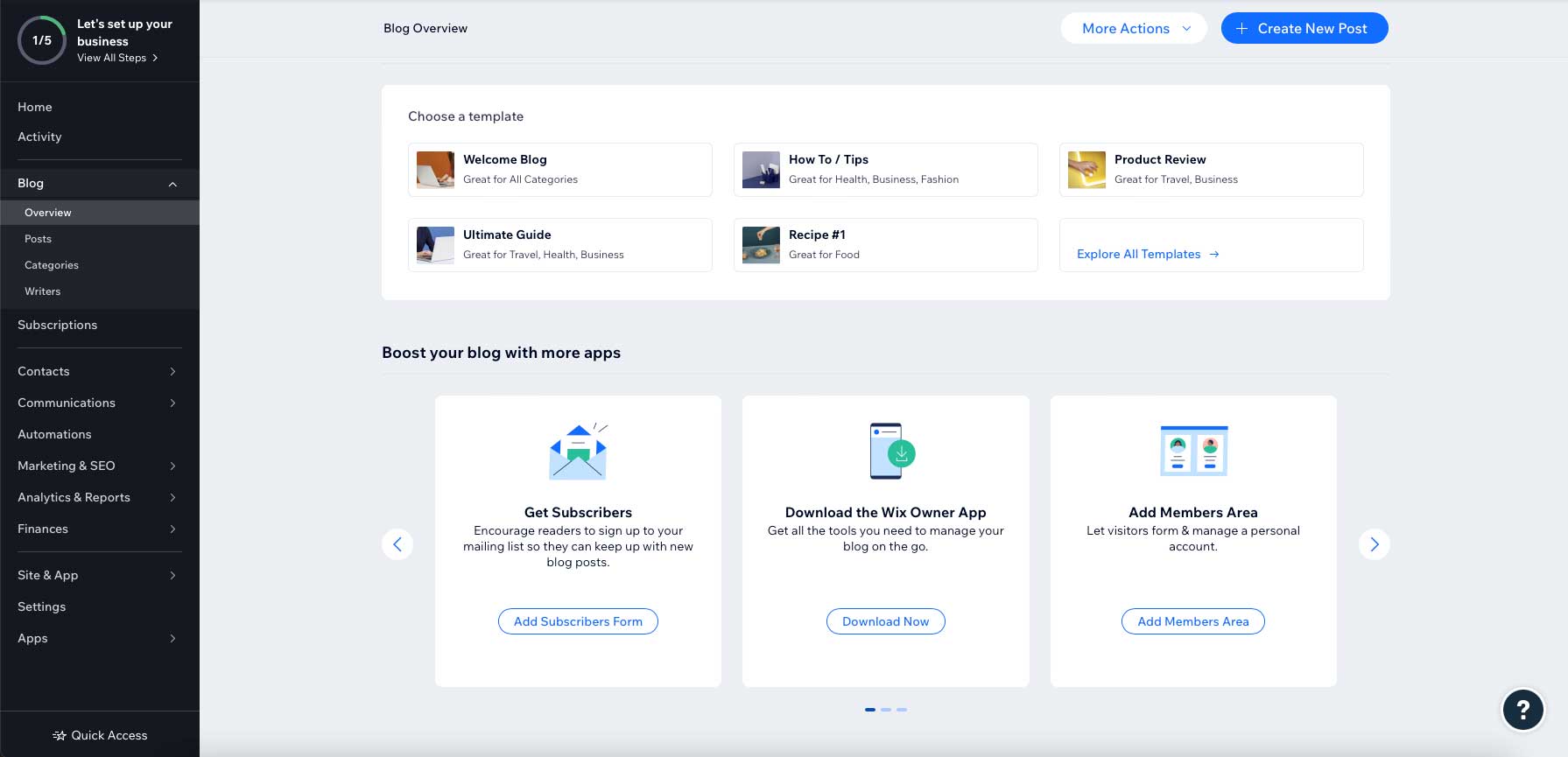
There are some nice marketing tools integrated with Wix. You can create opt-in forms, manage email subscribers, set up email automation, segment your subscribers, and create a workflow to assist you in visually tracking your leads and automation. Additionally, you can set up chat functionality in your dashboard to communicate with your site visitors.
Pros
- Well designed templates
- Easy to use for beginners
- Built-in tools for social media, SEO, analytics, and marketing
- You can sell digital products, accept payments, and run affiliate marketing programs
Cons
- Templates can be difficult to customize.
- SEO options are limited.
- Ads are prevalent if you’re not paying
Wix.com is for you if…
… you are a beginner who wants a create a blog website that you want to market and monetize. There are a lot of built-in features that will help you grow your audience, scale your business, and keep track of leads, conversions, and email subscribers. But, if you want more advanced customization and SEO options, consider other options on the list.
Wix.com Pricing: FREE, Paid plans start at $16 per month
See our review on Wix vs WordPress
6. Hubspot CMS (Best Blogging Platform for Marketing Agencies)
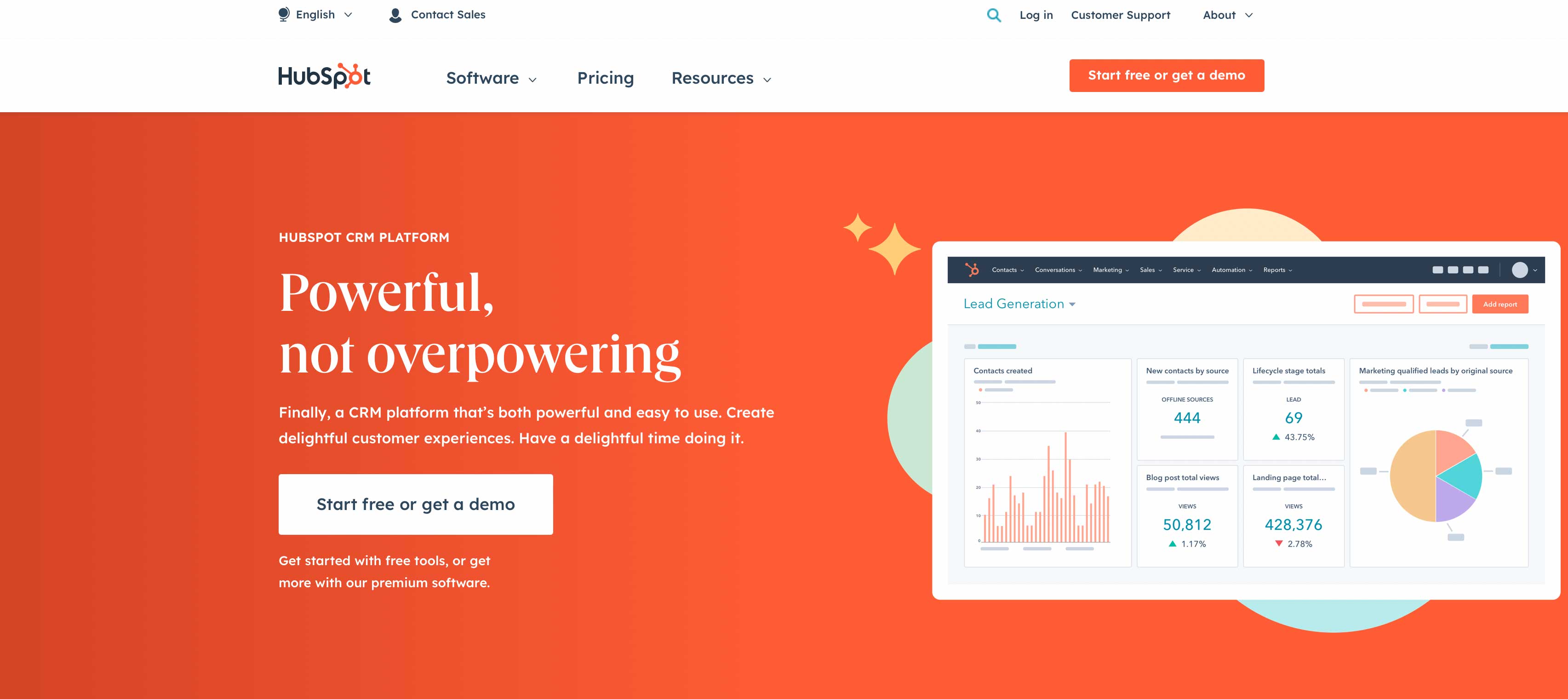
HubSpot CMS is a powerful and robust CMS platform built for marketing professionals as well as developers. HubSpot’s drag-and-drop website builder makes it easy for casual bloggers to benefit from HubSpot’s full-service marketing platform. HubSpot is a secure hosted platform where backups, marketing automation, subscriber management, email segmentation, and intuitive publishing tools are all standard. For customer management, you can gain new subscribers, build customer lists, and segment them. Additionally, you can create stunning email templates and newsletters, right within the platform.
For those who would rather use WordPress for blogging, HubSpot integrates with WordPress so you can still take advantage of HubSpot’s CRM.
Creating a blog is easy with HubSpot’s drag-and-drop builder. You can choose from a number of themes in its Marketplace, which can be edited to match your branding. You can easily edit colors and fonts, and add forms or other elements.
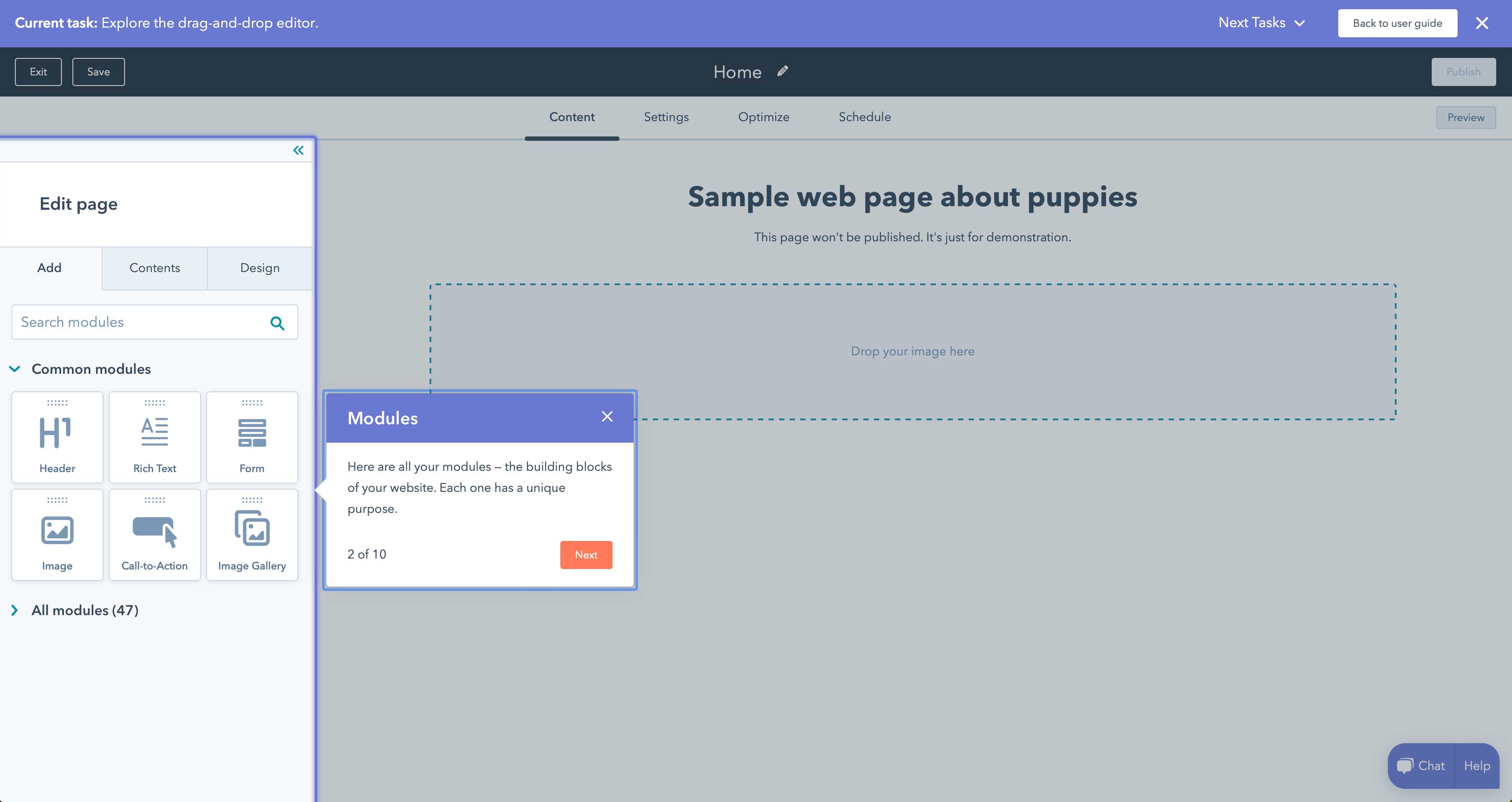
Setting up your blog is a simple process. HubSpot allows you to enter the details of your blog, choose a template, and publish content within a simple setup wizard that takes mere minutes to complete.
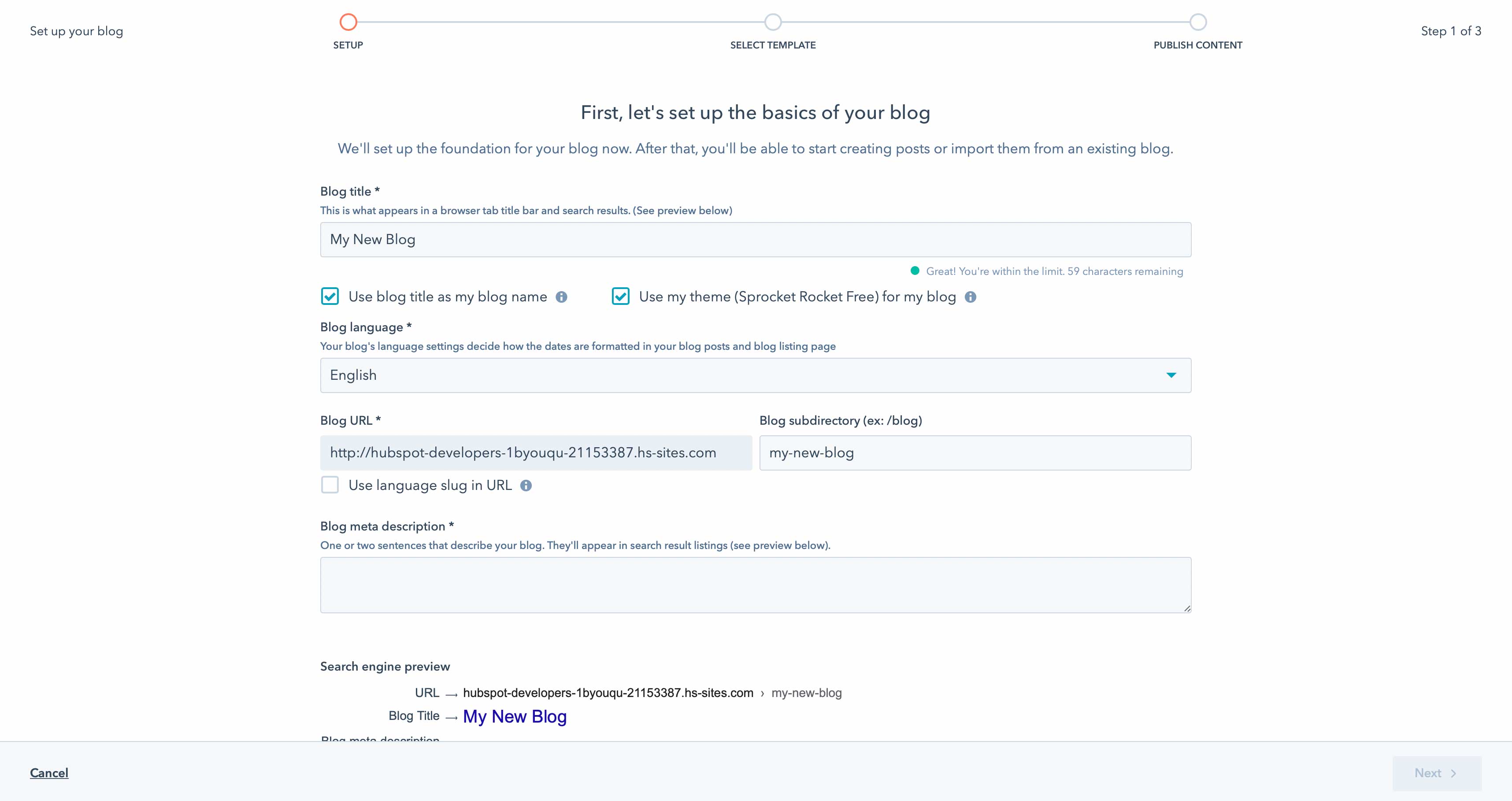
The visual editor displays your blog content as your viewers will see it. All the elements of your theme are visible including the hero section, sidebar, navigation, and footer. For a simpler approach, the distraction-free mode promotes ease of writing.
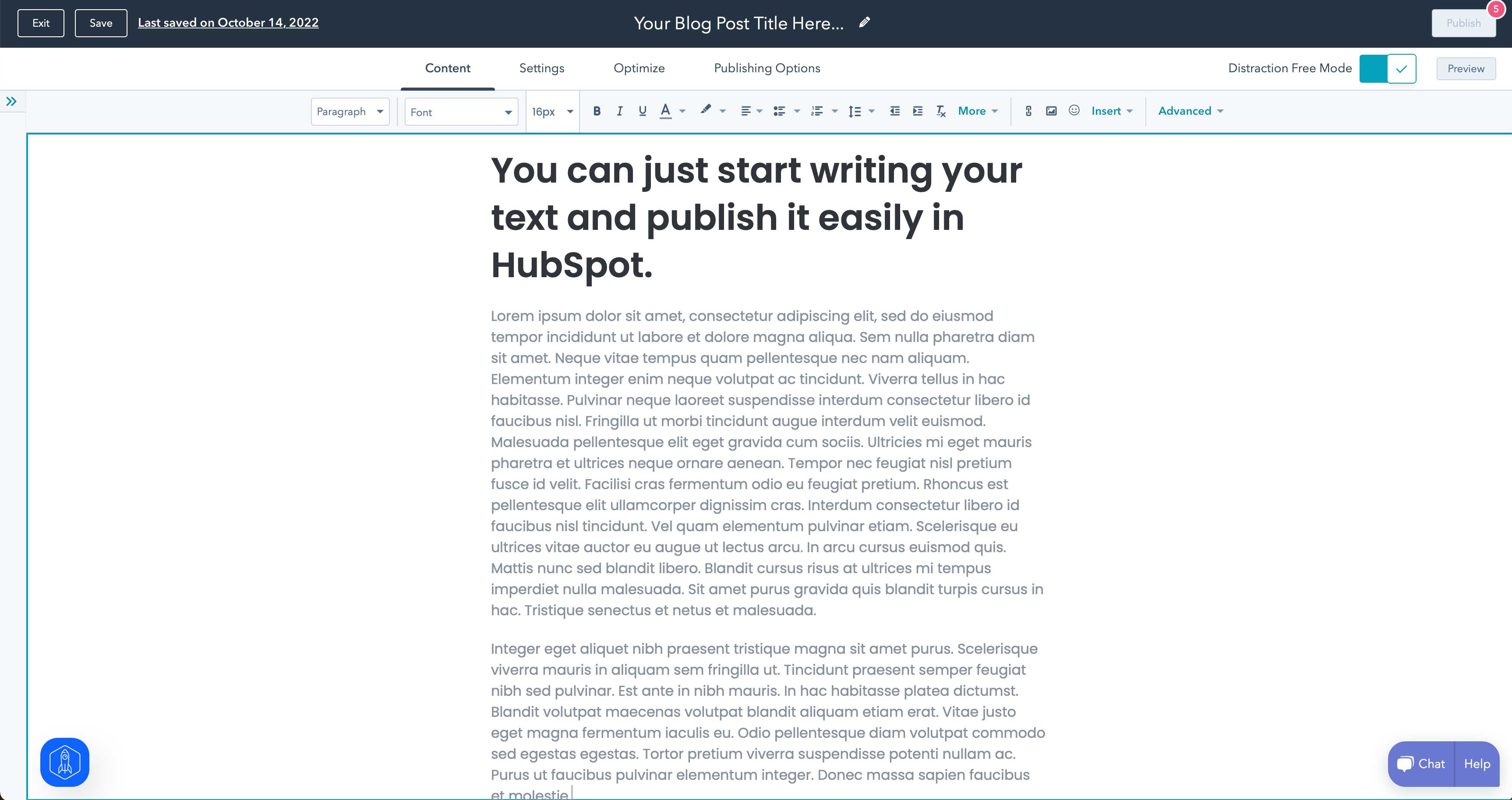
Pros
- Custom templates and tools to style your blog
- Powerful professional marketing tools for lead generation, email marketing, and analytics to help grow your audience.
- Built-in SEO features
- Easy to create and publish content
Cons
- The cost is more than other less robust blogging platforms
- Not for beginners. The advanced features require someone with more technical skills.
- More difficult to use and learn than other platforms.
Hubspot CMS is for you if…
you want a robust platform to grow your blog and business. Anyone who wishes to scale their business can benefit from it. That being said, the casual blogger will likely find HubSpot CMS a bit too much to handle. HubSpot is more suited to those who run medium to large businesses, or full-scale web agencies.
Pricing: Free, Paid plans start at $25 per month
See our review on Hubspot CMS vs WordPress.
7. Medium

Medium is a popular FREE blogging platform that emphasizes the quality of content more than anything else. Literally, anyone can sign up for an account with Medium and start blogging. That being said, Medium does have some caveats. First, you don’t control your content. Once you publish it, it belongs to Medium. Secondly, there is a ton of competition since there are millions of people putting their content out into the world. However, one of the best features of Medium is that it’s totally free. And, you can make money on Medium based on how many claps or likes your content receives.
Writing a post on Medium is easy. There aren’t a lot of bells and whistles, but there are enough to be effective. Aside from text, you can insert photos, video, and embed content from such media platforms such as Twitter. Plus, there’s a direct integration from Unsplash, which allows you to quickly link photos from their extensive royalty-free library.
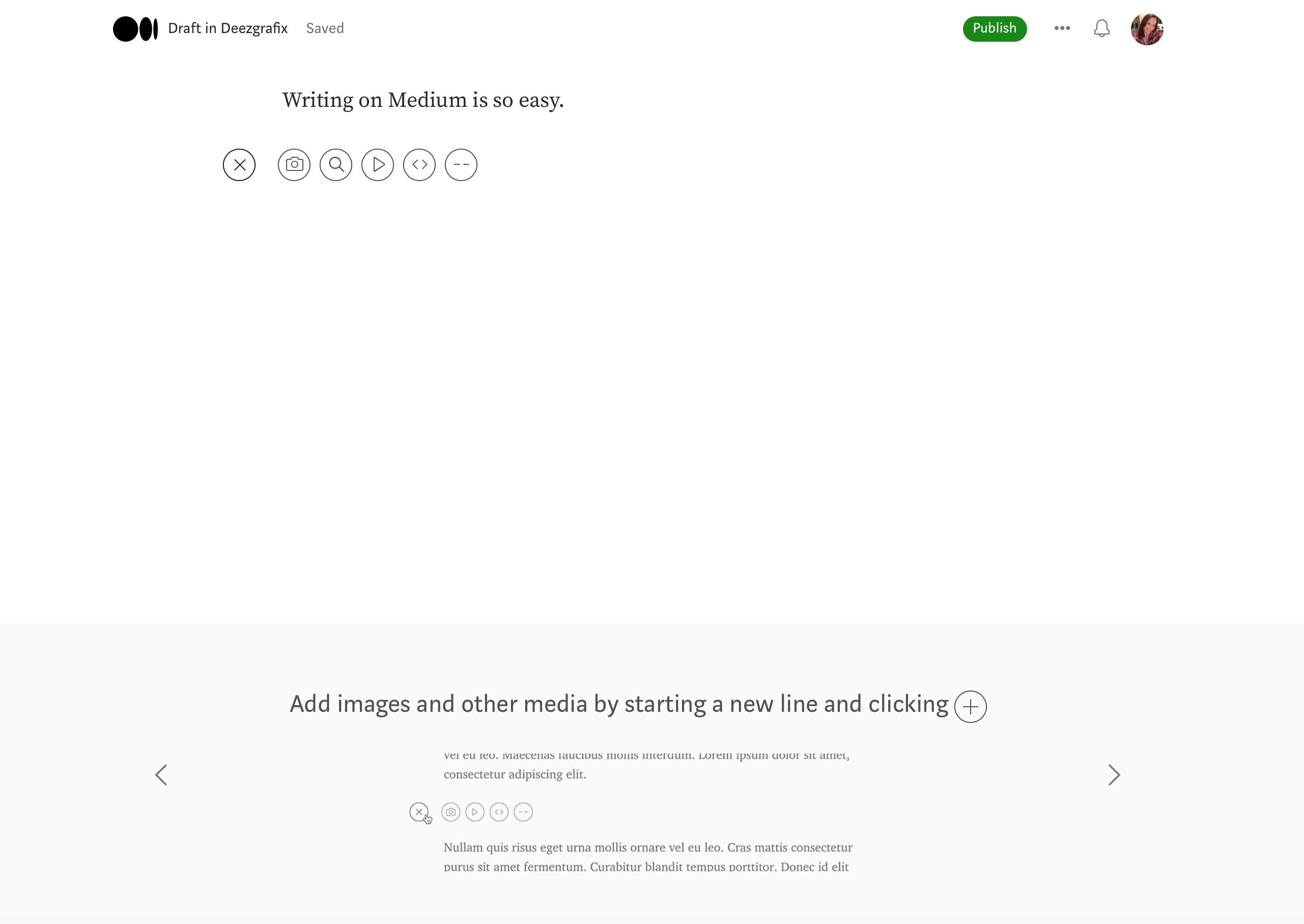
Pros
- Absolutely free to use
- Hosted so you don’t have to
- Free to focus on writing because you don’t have to worry about design
- Bloggers have the potential to reach a wider audience and build a following
- Paid subscription allows bloggers to earn revenue
- No designing experience is needed (there is nothing to design!)
Cons
- There is nothing to design
- Cannot run your own monetization or ad campaigns
- It’s a closed platform so you don’t fully own your content.
Medium is for you if…
…you don’t need an individual website (yet) but want to start blogging to reach a wider audience. The no-frills approach makes it easy to publish content for a huge potential audience. Plus, those who already have a blog website can still use Medium as a way to attract new subscribers.
Pricing: Free, Paid membership starts at $5 per month
See our review on Medium vs WordPress.
8. Ghost
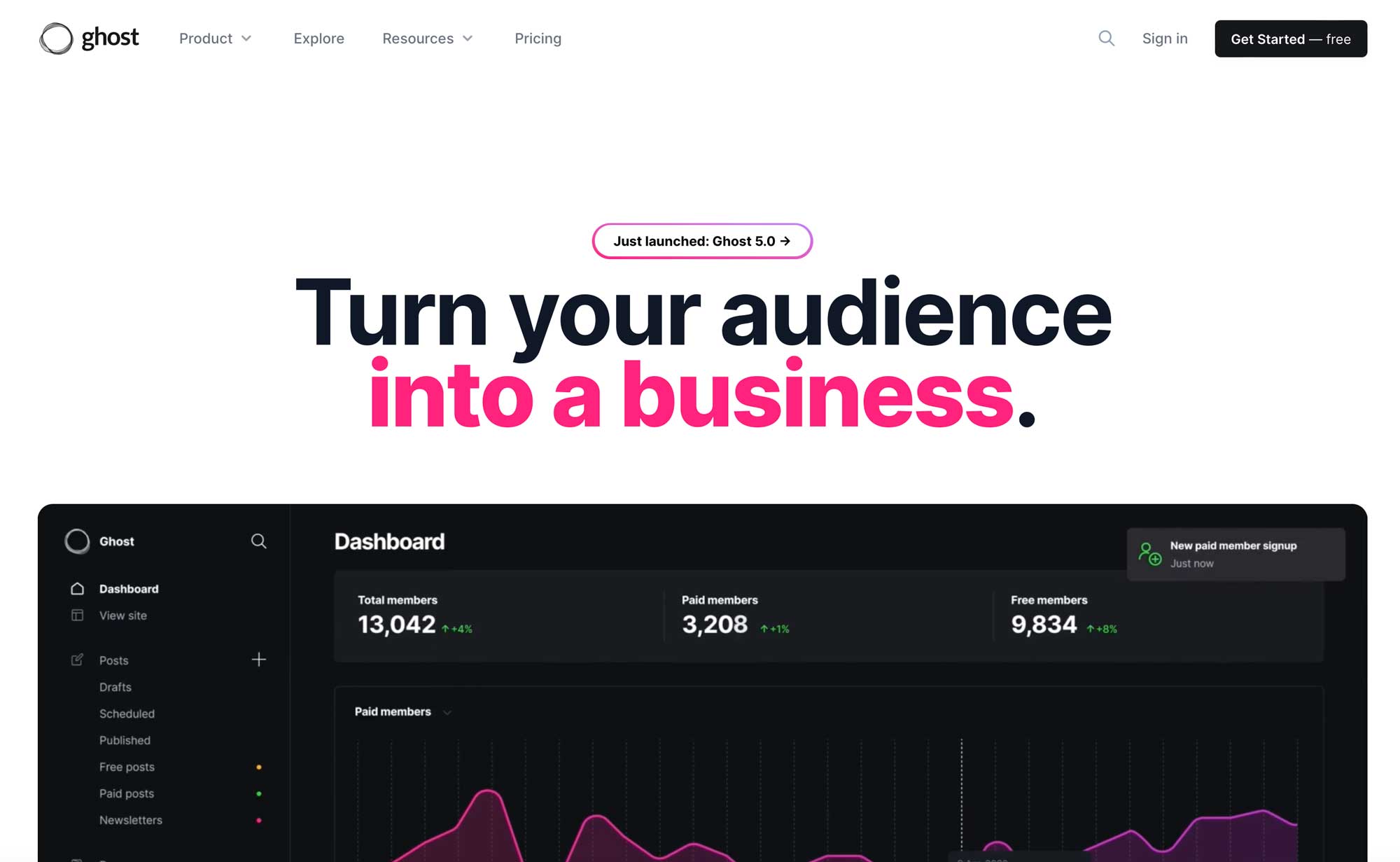
Ghost started out primarily as a blogging platform, but has evolved over recent years. No longer just for bloggers, Ghost advertises itself as a service for creators. You can publish content, send newsletters, offer paid subscriptions, create popups and opt-ins, and more – all from the Ghost dashboard. At first glance, Ghost appears to be positioning itself as a competitor against other drag-and-drop website builders on our list. With a price point for any user, Ghost offers premium features for a much lower price point than other platforms.
When it comes to blogging, Ghost makes it easy. The interface is comparable with WordPress’s Gutenberg, although there aren’t nearly as many options. You do have some choices for content including images, dividers, html, and some other common content types.
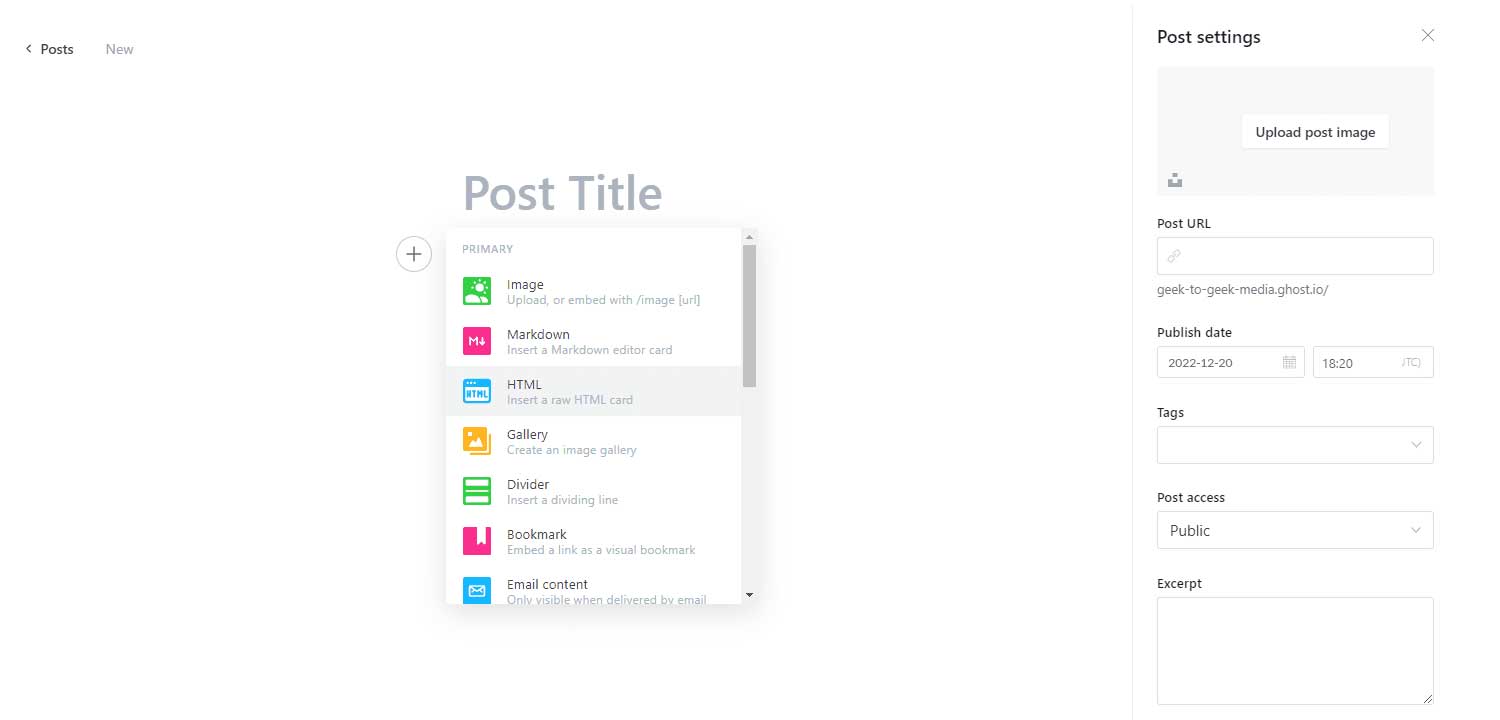
Where Ghost shines is in the extras you’ll get for growing your audience. With the ability to add subscribers, create membership tiers, and accept payments, you’ll have everything you need to easily create a premium content delivery system. In addition to that, Ghost allows you to easily manage your memberships – both paid and free – through their handy membership management system.
Pros
- Incredibly fast to use as a writer and a reader
- A blogging-first platform
- Intuitive interface
- Can use markdown or HTML to write your posts
- Continuously updated by the developers and the community
- Open source
- Membership and Email marketing tools to grow your audience
Cons
- Not every host is ready to support Ghost
- Installation on a host that does support Ghost can be complicated if you aren’t tech-savvy
- As a self-hosted option, you are limited to customization options
- Very few themes are available without hand-coding your own
- The community is still relatively small, but it is growing
Ghost is the best blogging platform for you if…
…you are a blogger who wants to grow your audience and easily monetize. Unlike other drag-and-drop website builders and blogging platforms, you’ll get membership and subscription tools built right in – even at the lowest price tier. Ghost probably isn’t the best blogging platform for beginners, but if you want a totally different experience from Blogger or WordPress, Ghost is it.
Pricing: FREE, Paid plans start at $9 per month
See our review on Ghost vs WordPress
9. Web.com
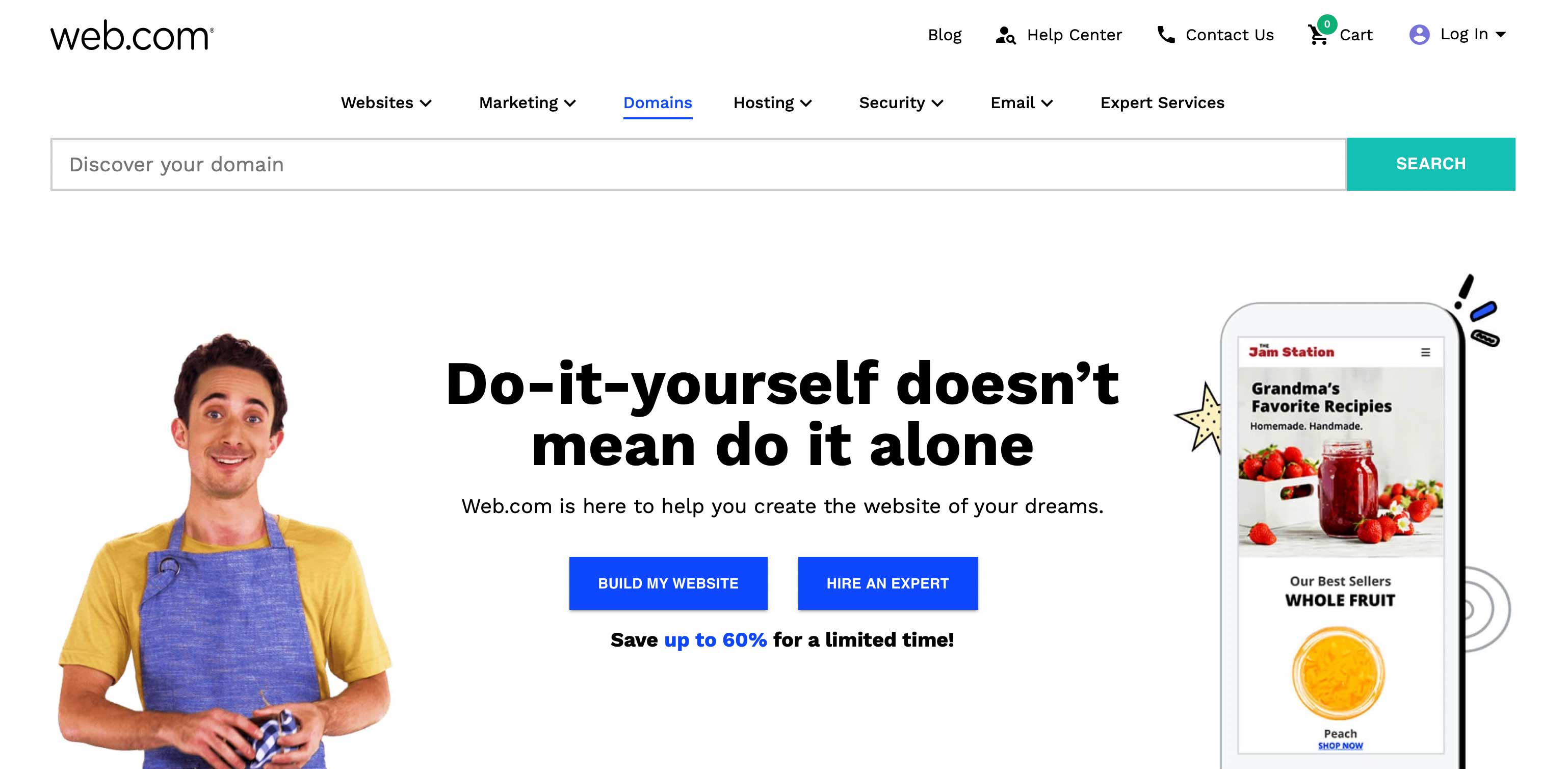
Web.com is another well-known site builder and blogging platform that enables you to easily build your blog in a few clicks. While not as robust as Wix, it has plenty of attractive features. One of the best things about Web.com is its ease of use, which is why some may prefer web.com over WordPress for simple sites. You can browse from a list of pre-made themes to build your site on, including those who wish to create a blogging site, and have your site up and running in a matter of minutes.
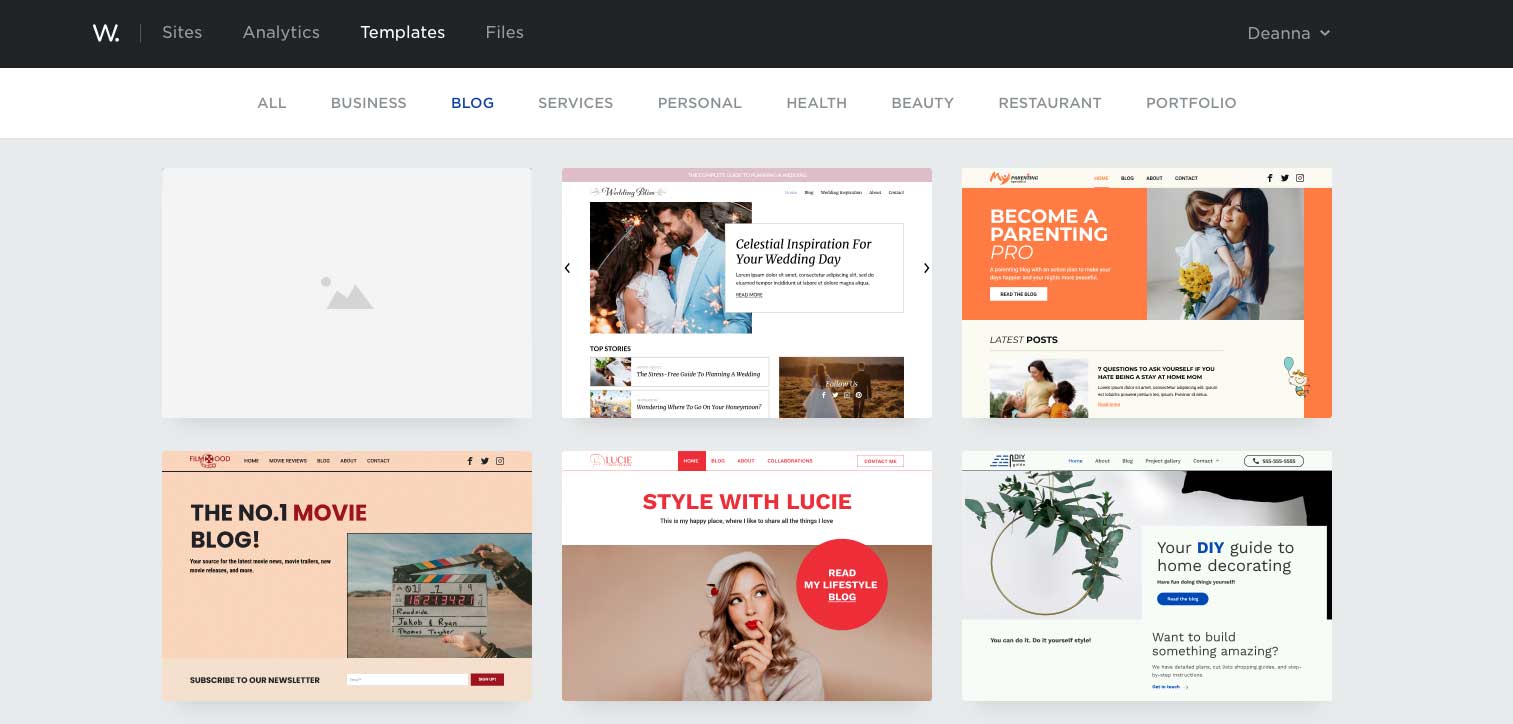
Web.com makes it easy to add content using its simple drag-and-drop builder. But, there aren’t a ton of options for content. You’ll get basic things like text, buttons, image galleries, sliders, form, and call-to-action blocks to name a few.

The look and feel of Web.com’s blog writing tool are similar to WordPress. This could be due to Web.com’s WordPress hosting offerings. There aren’t a ton of editing tools, but that doesn’t seem to be an issue. The point of Web.com is to make it easy to write and publish posts.
Pros
- range of design templates
- user-friendly drag-and-drop editor to create and manage blog posts
- includes hosting
Cons
- Primarily a website builder so blogging functionality more limited to other platforms
- You will have to pay for advanced features and customization options
- Template designs aren’t as good as other platforms
- Can be difficult to integrate with other services.
Web.com is the Best Blogging Platform for you if…
… you are a small business owner or blogger who’s looking for a super affordable option to start your blog. There are quite a few features included with their basic plan. Also, building a blog or website is super easy with Web.com. With a drag-and-drop editor, simple publishing tools, and marketing features, you’ll have your blog up and running in no time.
Web.com Pricing: $4.95 – $19.95/mo
See our review on Web.com vs WordPress
10. Blogger (or Blogspot)

Blogger is Google’s free blogging platform. Although it’s not a full CMS, it can definitely be considered software. If you’re simply looking for a way to share your thoughts with the world, Blogger will do that with very little effort on your part. Similar to Google Docs, writing and posting content will seem intuitive. Even though Blogger is free, it does have quite a few features that are worth taking a look at.
Blogger makes it easy to add content. The post editor looks and functions much like Word documents or Google docs. There aren’t a lot of options here other than the standard text, image, links, and video options.
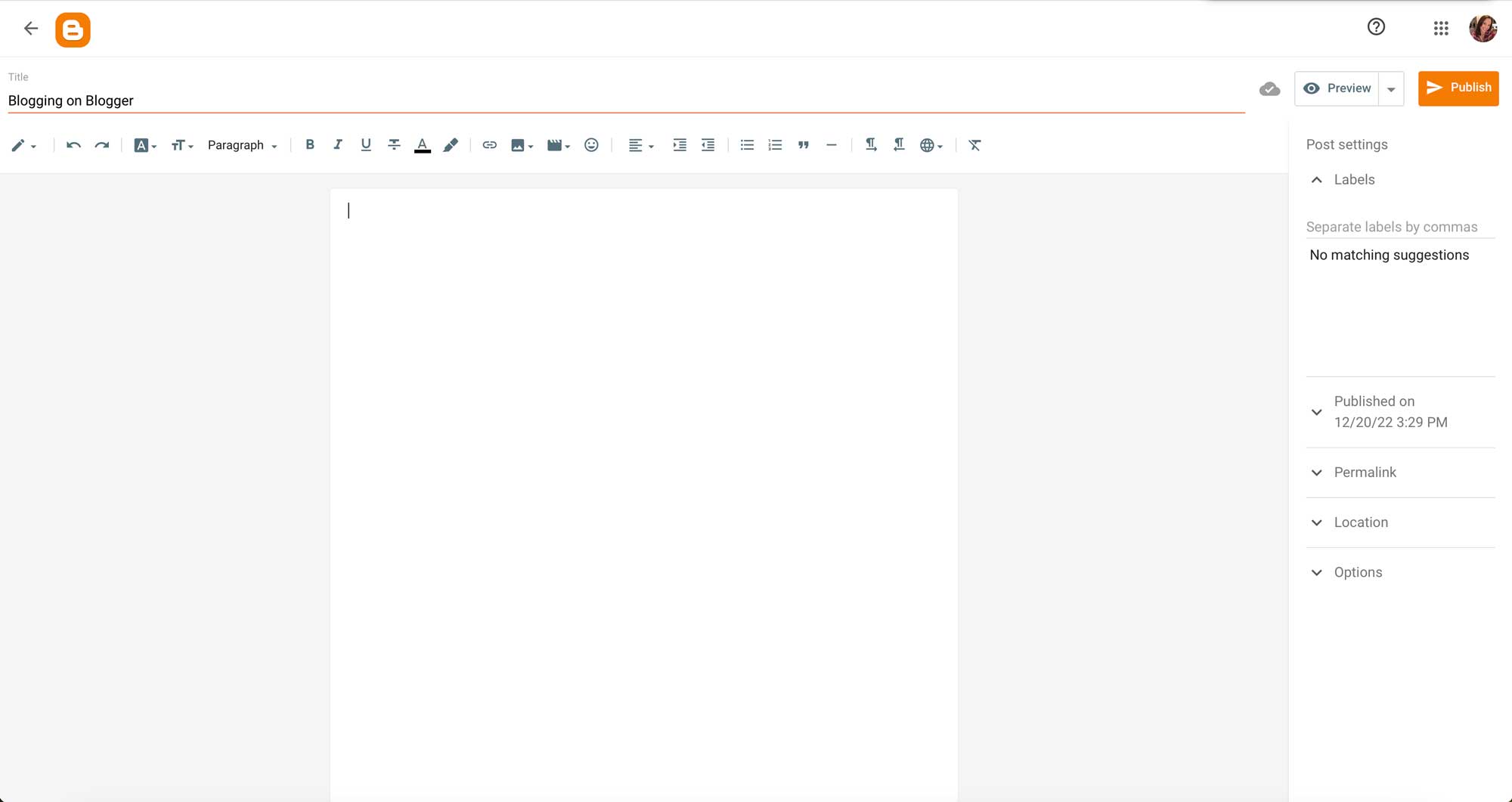
There are no integrations to use, no plugins, or add-ons. Blogger is simple, which makes it an attractive choice for beginners. And you can actually earn money using Blogger.
A key advantage to using Blogger is its integration with other Google services such as Google Analytics and AdSense. So users can insert ads or affiliate links into their posts for monetization. Plus, you can actually use your own domain free of charge, which is a nice feature. Lastly, if you decide to choose a different platform, such as WordPress, you can export your posts with very little effort.
Pros
- Integrated with your Google account
- Easy to monetize and track analytics
- Focuses on your writing and personal story
- Thousands of free layouts are available, with many premium ones out there online
- Hosted by Google
- Easy for the non-technical to set up and use
- Free to add a custom URL
Cons
- Limited customization options
- No plugins
- Cannot run anything but AdSense ads
- Not set up for eCommerce or as a full CMS, so you can’t use Blogger as your company’s blog on the same URL
- Google has a history of abandoning projects they feel underperform — Reader, Wave, Goo.gl, Inbox, and so on. However unlikely, with Google it is always possible
Blogger is for you if…
…you are looking for a simple blogging platform with a wide audience. Blogger is the oldest standalone blogging platform on the internet, so they have it down pat. And it is a great option for those who want to integrate other Google services and monetize their blog with ads.
Pricing: FREE
See our review on Blogger vs WordPress
11. Tumblr

Tumblr is a microblogging platform that is popular for its social media-like features and visual focus. It is a unique platform on the list that offers a mix of blogging and social media capabilities, making it an ideal option for bloggers who want to share their content and connect with their audience in a visually appealing and interactive way.
Perhaps the best feature of Tumblr is the ability to post several types of content. With Tumblr, users can create text, as well as share photos, quotes, links, chat, audio, or video files.

Creating new posts is a straightforward and easy process. Simply add a title, write your body content, and click post now. That’s it. While there isn’t thing fancy about Tumblr, its ease of use makes it a popular platform. There’s no software to learn, no themes to choose from, and no integrations to fiddle with. What you see is what you get.
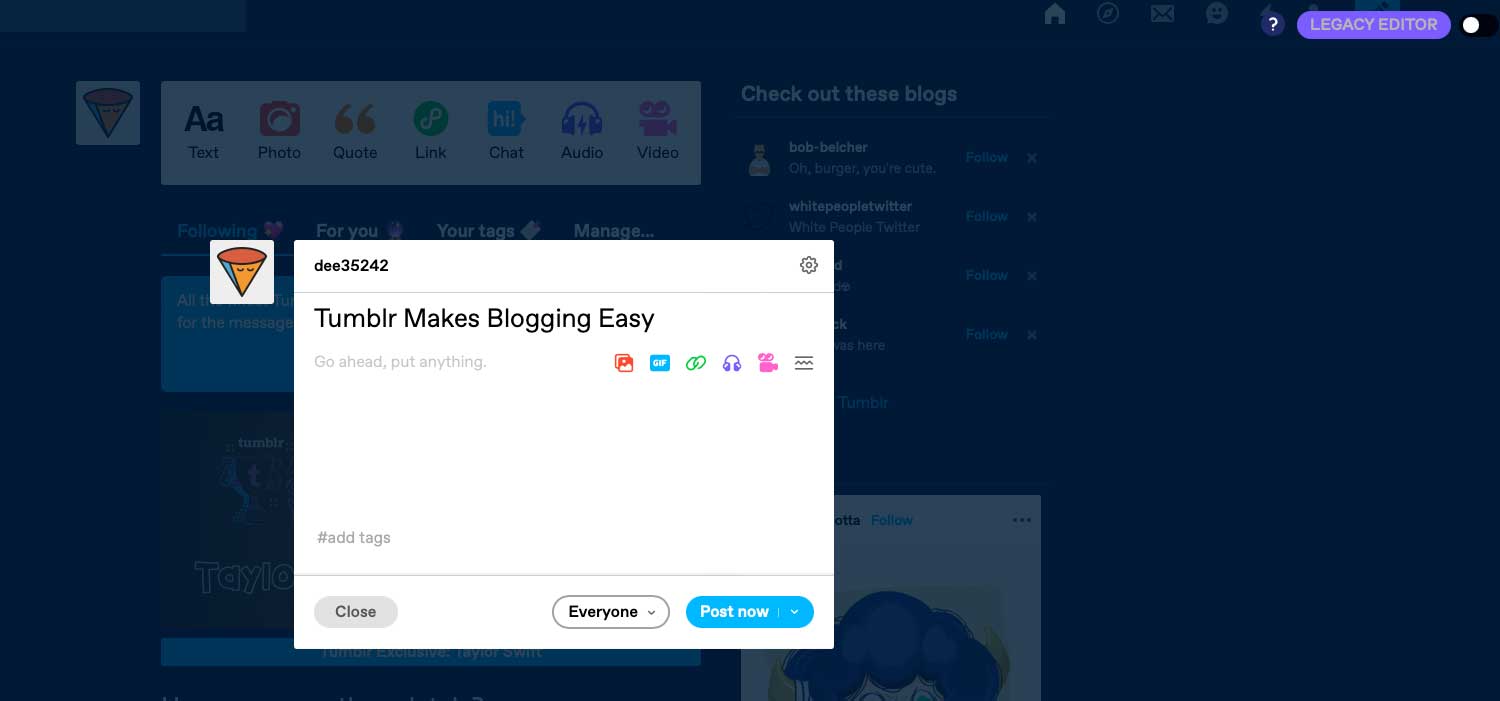
Pros
- Building a community is a focus of the platform
- Blogging and creating content at the forefront
- Built-in tools for users to contact you
- The hosted platform is stable and secure
- Image-heavy for people already used to Instagram
- Reblogging lets you focus on curation, rather than original content
- You can queue up reblogs to always keep your blog active, even if you are not
Cons
- Non-traditional blogging and comment structure can be off-putting
- No control over your audience information (such as email lists)
- Very little customization or style choice
- No ability to monetize with ads or to run an eCommerce store or full website
Tumblr is the best Blogging Platform for you if…
… you’re looking for a more social media-like experience for blogging focused on visuals. It isn’t a social network, but it’s more like that than anything else. That being said, you can post a lot of different types of content, and you can easily chat with your readers. Plus, there are no fees, no software to set up, and no worries about SSL’s security or anything related to managing a stand-alone website.
Tumblr Pricing: Free
See our review on Tumblr vs WordPress
What is the Best Blogging Platform? (The Verdict)
| Plugin | Price | Free Option | ||
|---|---|---|---|---|
| 🥇 | WordPress.org | Free | ✔️ | Visit |
| 🥈 | WordPress.com | $5/month | ✔️ | Visit |
| 🥉 | Squarespace | $23/month | ✔️ | Visit |
| 4 | Weebly | $13/month | ✔️ | Visit |
| 5 | Wix | $16/month | ✔️ | Visit |
| 6 | HubSpot CMS | $25/month | ✔️ | Visit |
| 7 | Medium | Free | ✔️ | Visit |
| 8 | Ghost | $9/month | ✔️ | Visit |
| 9 | Web.com | $4.95/month | ❌ | Visit |
| 10 | Blogger | Free | ✔️ | Visit |
| 11 | Tumblr | Free | ✔️ | Visit |
The best self-hosted blogging platform is WordPress.org. Nothing compares to the WordPress CMS if you are looking for full control over your blog and website. The countless themes and plugins can extend the functionality of your blog in endless ways. Plus, page builders like Divi can give you all the design tools you need for your blog without having to know how to code. But if it becomes too much of a learning curve for beginning bloggers, WordPress.com is a great hosted option.
If you are looking for a true blogging platform, Medium has a great established audience that you can use to grow your following as a new blogger. But we wouldn’t recommend using Medium as your main blogging home in the long run.
Squarespace is probably the best website builder for blogging on the market. If you want an all-in-one hosted platform for your blog, Squarespace has some great core features, especially for eCommerce, and overall better-looking designs. Weebly would be a close second in the website builder space for its amount of built-in features. And if you are a beginner, you might want to give Wix a try. That said, every platform has its benefits, and you should be able to find the platform you need with any of these we’ve listed.
Article featured image by PureSolution / shutterstock.com
The post 11 Best Blogging Platforms in 2023 (& How to Choose One) appeared first on Elegant Themes Blog.
The Tech Zone
Comments
Post a Comment